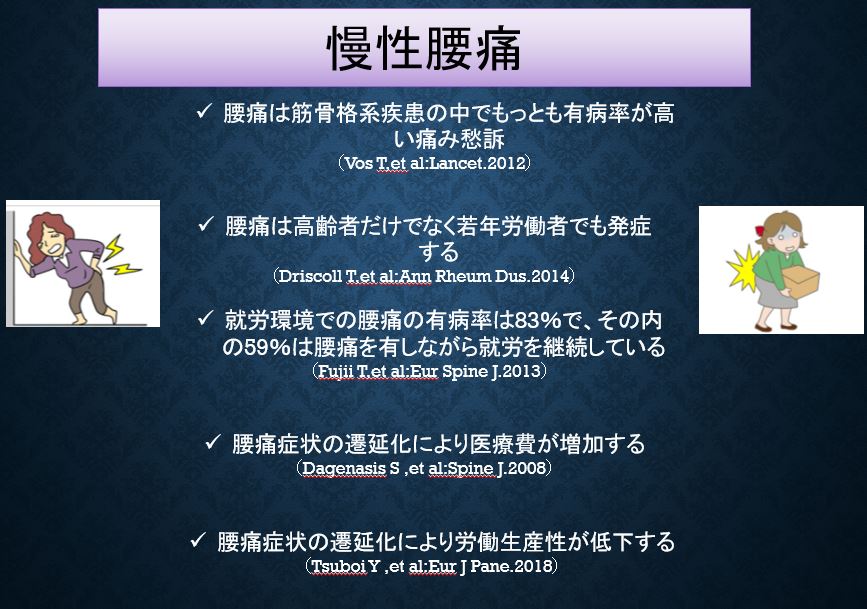こんにちは!
運動器専門のリハビリスタッフです!!
いつもお世話になります。
今回は、『睡眠障害は腰痛の改善率を悪化させる?』について解説させていただきます。
腰痛は筋骨格系疾患の中でもっとも有病率が高い痛み愁訴であり(Vos T,et al:Lancet.2012)、
高齢者だけでなく若年労働者でも多く発症します(Driscoll T,et al:Ann Rheum Dus.2014)。
就労環境での腰痛の有病率は83%で、その内の59%は腰痛を有しながら就労を継続している(Fujii T,et al:Eur Spine J.2013)と言われており、腰痛症状の遷延化により医療費が増加する(Dagenasis S ,et al:Spine J.2008)ともされています。
また、腰痛症状の遷延化により労働生産性が低下する(Tsuboi Y ,et al:Eur J Pane.2018)との報告もあります。

そんな中2018年に、睡眠障害と慢性腰痛との関連性について報告している論文が海外で報告されています。
内容が気になるところですね。
◆論文紹介
Pain Pract (IF: 3.18; Q3)
. 2018 Jan;18(1):79-86.
doi: 10.1111/papr.12584. Epub 2017 May 28.
Persistent and Developing Sleep Problems: A Prospective Cohort Study on the Relationship to Poor Outcome in Patients Attending a Pain Clinic with Chronic Low Back Pain
持続的かつ発展的な睡眠問題。慢性腰痛でペインクリニックを受診した患者さんの予後不良との関連性に関する前向きコホート研究
Amir H Pakpour 1 2, Mohammadhossein Yaghoubidoust 1, Paul Campbell 3
Affiliations expand
- PMID: 28423222 DOI: 10.1111/papr.12584
Abstract
Sleep problems are common in people with low back pain (LBP); however, the mechanisms of how sleep influences pain are complex. To date there is a lack of prospective research on the timing and development of sleep problems in those who have LBP; such information would be useful to identify individuals at risk for poor outcomes. Our aims are to investigate the predictive role of sleep problems on self-report recovery and pain intensity using logistic regression reporting odds ratios (ORs).
睡眠の問題は、腰痛を持つ人によく見られます。しかし、睡眠が痛みに影響を与えるメカニズムは複雑です。今日まで、腰痛患者における睡眠問題の発生時期と発展についての前向きな研究は不足しており、このような情報は、悪い結果をもたらすリスクのある個人を特定するのに有用である。我々の目的は、ロジスティック回帰法によるオッズ比(OR)を用いて、自己申告による回復と痛みの強さに対する睡眠問題の予測役割を調べることである。
An observational cohort of 761 chronic LBP patients recruited from a pain management clinic participated, and they completed data at baseline and at 6-month follow-up (n = 682).
疼痛管理クリニックから募集した慢性LBP患者761人の観察コホートに参加し、ベースライン時と6カ月後のフォローアップ時にデータを記入した(n = 682)。
Results show increased odds for reported nonrecovery (OR 1.52) and pain intensity (OR 2.69) among those who reported sleep problems at baseline. Further analysis on the experience of sleep problems through time showed that those with developing sleep problems (ie, no sleep problems at baseline but reported sleep problems at follow-up) were at increased odds for reporting nonrecovery (OR 2.17) and pain intensity (OR 2.95), as were those who reported sleep problems at both baseline and follow-up, for recovery (OR 2.88) and pain intensity (OR 3.45). Those with resolving sleep problems (ie, sleep problems present at baseline but not at follow-up) were at decreased odds for nonrecovery (OR 0.50) and pain intensity (0.49).
その結果、ベースライン時に睡眠問題を報告した人では、報告された非回復性(OR 1.52)と痛みの強さ(OR 2.69)のオッズが上昇した。さらに、睡眠問題の経験を経時的に分析したところ、睡眠問題が進展している(すなわち、ベースラインでは睡眠問題がなかったが、フォローアップでは睡眠問題を報告した)人は、非回復(OR 2.17)と痛みの強さ(OR 2.95)を報告するオッズが高く、ベースラインとフォローアップの両方で睡眠問題を報告した人は、回復(OR 2.88)と痛みの強さ(OR 3.45)を報告するオッズが高かった。睡眠問題が解消された人(すなわち、ベースライン時には睡眠問題があったが、フォローアップ時にはなかった人)は、非回復(OR 0.50)と痛みの強さ(0.49)の確率が低下した。
◆論文の結論
Presenting, persistent, and developing sleep problems have a significant impact on recovery for those with LBP. Clinicians may wish to consider treatment options that can address sleep problems.
睡眠問題の発生、持続、発展は、LBP患者の回復に大きな影響を与える。臨床家は、睡眠の問題に対処できる治療法を検討するとよいだろう。
◆まとめ
上記論文ではペインクリニックの慢性要津患者761人を対象に調査しております。
調査開始時に睡眠障害があった方は腰痛の『非回復性』『痛みの強さ』のオッズが上昇
調査開始後から睡眠障害が発生するとさらに『非回復性』『痛みの強さ』のオッズが上昇
調査開始時も調査開始後も睡眠障害があると、より『非回復性』『痛みの強さ』のオッズが上昇することが報告されています。
また睡眠障害が解消された方は『非回復性』『痛みの強さ』のオッズが低下することもわかったいるようです。
よって、この論文から以下のことが読み取れます。
・睡眠障害があると腰痛の強さが増強し、回復しにくくなる。
・睡眠障害が改善すると腰痛の軽減し、回復の傾向にある。
また論文中には慢性腰痛を有する一般成人において、睡眠障害の有症率は48%であると報告されていました。
今回は、『睡眠障害は腰痛の改善率を悪化させる?』について解説させていただきました。



